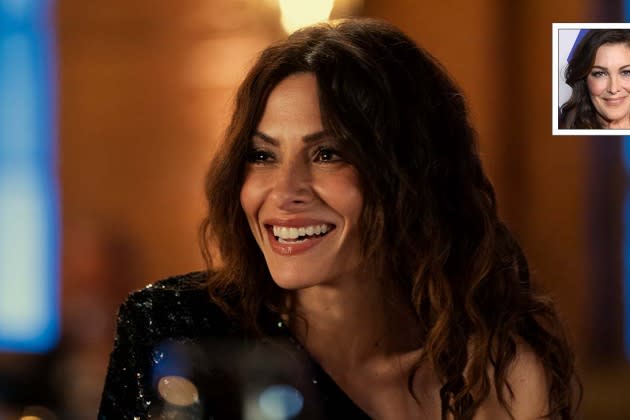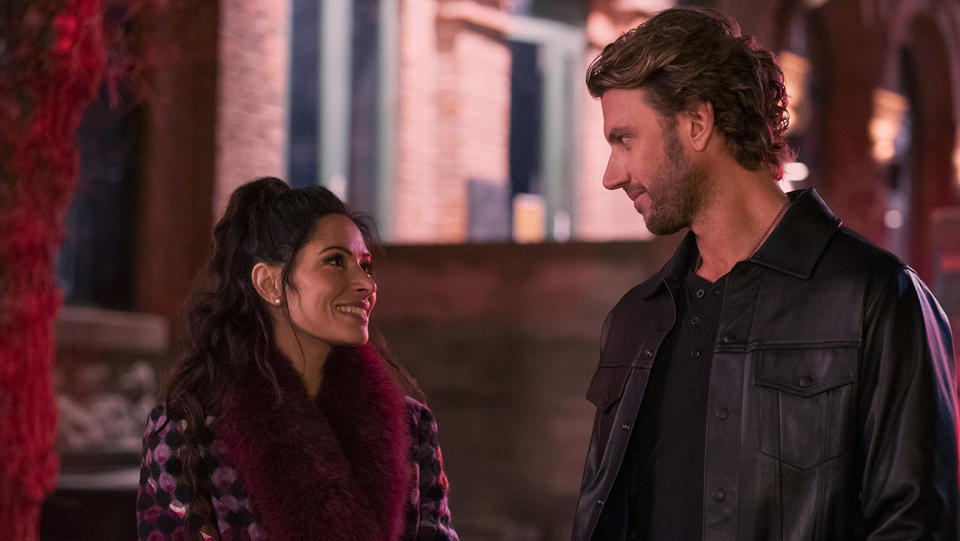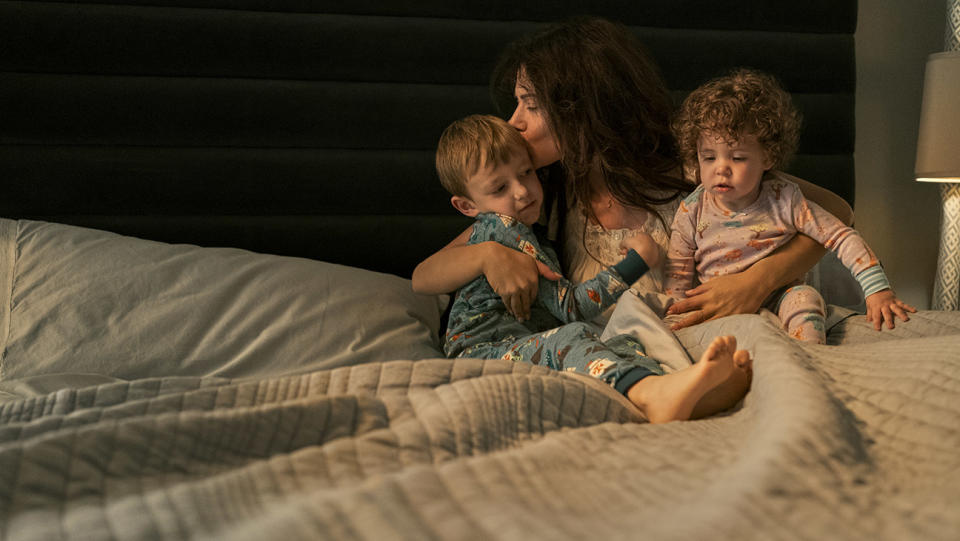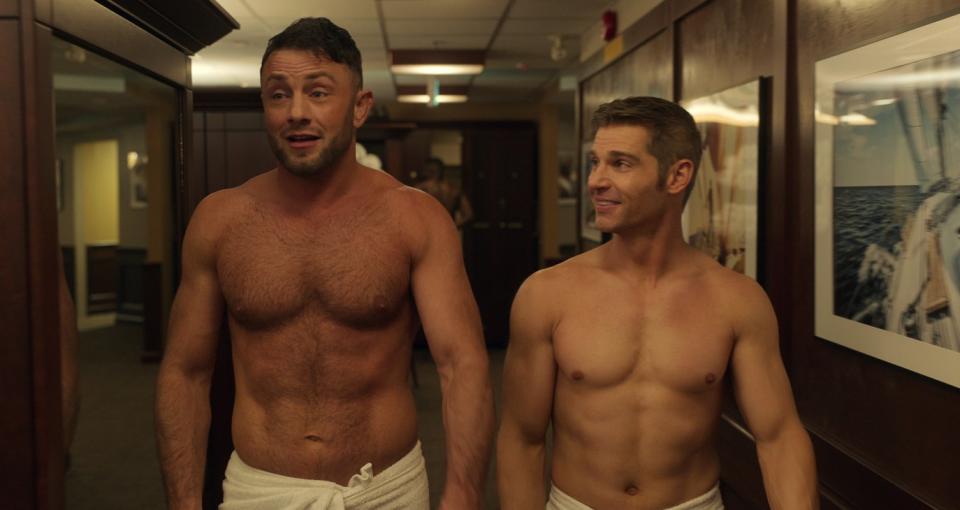‘Sex/Life’ Boss Weighs In on Most Talked-About Scenes and Future Plans for Netflix Series

[This story contains spoilers to the season two finale of Netflix’s Sex/Life.]
The second season of Sex/Life may have ended with happily ever after, but creator and showrunner Stacy Rukeyser says there is still much more story to tell.
More from The Hollywood Reporter
Priscilla Presley Makes First Event Appearance Since Daughter Lisa Marie's Death
Why Jenna Ortega Says She Became "Unprofessional" on the Set of Netflix's 'Wednesday'
Jason Clarke, Scott Eastwood, Chaske Spencer Join 'Wind River' Sequel
The steamy Netflix drama starring Sarah Shahi ended its six-episode sophomore season by reuniting Billie Connelly (Shahi), now a divorced mother of two, with her ex Brad (Adam Demos) after setting them on separate paths for most of the season. The finale saw the pair more connected than ever as they get married on the beach and react to Billie’s news that she is pregnant.
While Rukeyser awaits news about a potential third season — “Netflix has two calls. One is after 10 days and one is after 28 days. And that’s when your fate is decided,” she says — she shares below with The Hollywood Reporter her plans to continue telling this bingeable story about female sexuality and identity, spills secrets about the most-talked about sex scenes of the season (including another prosthetic penis) and reflects on being at the point in her career where she no longer has to fight to tell authentic stories about her female characters.
So, the ending could be interpreted in two ways. Either, an aspirational bow to end the series. Or, a new way to push Billie’s (Sarah Shahi) story forward. Which is it, if you have your way?
The episode was never intended to be a series finale, that’s for sure. I know there are always more stories to tell with these characters in the Sex/Life universe, and I hope we get the chance to tell those stories. It was important that we get to a meaningful place with each character this season. My guiding mantra was that this is a fairytale; this is not a morality tale. And that had a lot to do with how some people felt about what Billie did at the end of the first season.
Some people thought Billie should be punished for what she did, and I was really adamant that is really against the ethos of our show. I’m not going to tell a story about a woman with sexual desire who gets punished, because that is what happens in film and television all the time about a woman like that; she either goes crazy, or becomes the bad girl or the bitch, or is punished in some way. This is a story about hope and second chances. We’ve always been aspirational and inspirational, and I’m trying to put out the message that everyone deserves to find happiness no matter the mistakes they’ve made. So it was important with her and every other character that they get their version of a happily ever after, at least for right now.
When you set out to make Sex/Life, how many seasons did you envision?
Look, we could make 117 seasons of this show! We are not short on ideas. Certainly, I think there is a lot more to do with these characters that is part of what I thought from the beginning. So, I hope we get to.
What was the feedback like when you first pitched this idea to explore female sexuality and desire through a female gaze?
What was really fortunate is that we had an executive at Netflix, Irene Lee, who I say has been the prime mover of Sex/Life. She’s the one who saw sort of a blank space in the TV landscape and wanted to do a show like this. She had optioned the book 44 Chapters About 4 Men that was really a jumping off for the series — Sex/Life is inspired by the book, not based on it because I brought in a lot of personal connection to the material and my own sort of experience and imagination. But she was trying to do something in this space, and she knows the genre really well and decided to make it really sexy. And that was definitely a mandate from Netflix — that we make a big, juicy, erotic show.
And the “e” word is something people have different feelings about. But what was exciting was that I knew that no matter how big and juicy and erotic we made it, it would always be told from an empowered, female point of view. That’s what I sort of bring to the table and insist on, and Netflix was really supportive about doing something that was escapist and fun and yes, sexy, and hot guys and the female perspective on desire and identity and all of that. But that also had these deeper themes about the choices we make as women and the sacrifices we make, and the things we should maybe resurrect within ourselves.

Have you gotten early feedback yet from Netflix about how the season is performing?
No. So, Netflix has two calls. One is after 10 days and one is after 28 days. And that’s when your fate is decided! So, we’ll see. I can see what everyone else can see, which is the Top 10 list and in how many countries around the world we’re No. 1. It’s a huge number, it was 63 a couple of days ago. So, that seems good! But I don’t have any data from Netflix yet.
Did you go into season two any differently, considering the state of TV and how many shows are getting canceled after two or three seasons?
Not necessarily. Look, it’s a scary landscape that that’s the reality. But it’s my job, within all of that, to find a story that is authentic and that I feel is real for these characters and that resonates with me, personally, and is putting out a message I can stand behind. It was Bela [Bajaria]’s idea to cut it to six episodes from eight for season two, and that was in the wake of Normal People, which did really, really well. She felt like for these relationship-based shows, that’s the sweet spot to make it fully bingeable. Like I said, we have 117 seasons that could be written, so we could have written a lot more! But those are decisions that are made above my pay grade. And anecdotally, what I’ve seen on social media is so many people saying they’ve binged the whole thing.
When it comes to telling this story of moving on after divorce and coparenting (and being pregnant again), what excites you about exploring Billie trying to have it all in this next phase of her life?
There are a million ways to go in season three, and the very early conversations that we’ve had are quite varied. So, that is a little bit up in the air. I put in the fact that Billie was pregnant at the end for two reasons. One is that it’s a satisfying story point that this was something that was so important to them as a couple and, if you’re going to give them a fairytale ending well, let’s give them everything. But it was also because it was a little bit of a dangling carrot for what the third season could be about.
Now she’ll be back in that situation again of being a new mom and, even if you’re with impossibly sexy Brad, is there a way to be all parts of yourself at once? And to get everything from one person? It’s that whole Sex/Life dilemma that I think is really interesting. I’m very proud of the coparenting story and the place that we got Billie and Cooper [Mike Vogel], but who knows what happens there. Coparenting is not always a smooth straight line, so there are definitely a million directions we could go.

Does it surprise you that amid all the sex your female star is having, it’s the full-frontal male nudity that again goes viral?
(Laughing) It’s interesting because I have seen some people who are upset that there wasn’t more sex this season. And then there are some people who are upset because there was more sex this season, and it’s too much sex. There are some people who feel like we are breaking the fabric of the moral society with this show, and there are other people who feel that it’s a far too conservative show because we do sort of posit connection and that marriage is a happy ending, at least this season. So, you cannot please everyone.
The [full-frontal nudity] scene with Jonathan Sadowski is hysterical, and I’m glad people are talking about it. It’s great comeuppance for his character. We do punish male characters who act the way Devon [Sadowski] acts in this season. I think that Jonathan is really a comic genius and is hysterical in the scene. And, by the way, Mike Vogel is also a comic genius. Because in both of our full-frontal scenes, both seasons, it’s Mike’s reaction that really sells it.
But what I was also excited to see is that the sex scene with very pregnant Gigi [Wallis Day] is also getting some notice. As a formerly pregnant woman (laughing), that means so much to me because it’s about normalizing that pregnant women are sexual beings. It can be sexy. Women have desires, all kinds of women, at all different stages. That is also an “oh my God” moment to me. Part of our mandate is also to have these big “oh my God” moments, which is fine by me because I love writing big twists and turns. But it always comes from a place of character and story. That’s how it started in the first season — it was all about Cooper’s obsession with Brad, who his wife was obsessed with, and it led him down that rabbit hole. Here it was like, what’s the end of Devon’s story? And this was very on-brand.
You work very closely with your intimacy coordinator, Casey Hudecki, who has talked about preparing Jonathan Sadowski for that scene.
Casey is amazing. I was just talking about her this morning to another director who was asking how we did some of the things in the scenes. There are many different roles to an intimacy coordinator. They talk to the actors, find out what they are OK and not OK with, put that in a legal rider so everyone knows what’s OK and what’s not, and provide the actors with the intimacy garments to cover their bits and pieces. And, that’s great. But Casey comes from the world of fight coordinating, so she’s also a choreographer. She’s so good at knowing how to position the actors and where the camera needs to go; she works really well with the directors to make sure we’re getting what we need. And she’s also looking at the intimate scenes to make them so specific: “What is the breath in this scene? What kind of sex is this? What is the experience?” Writing and shooting our intimate scenes has always been about the female experience. I know a lot of people think of intimacy coordinators as like a school crossing guard saying, “You can go here, you can’t go here.” But it’s so much more than that. She stands with me by the monitor, watching the whole thing.
She also confirmed Sadwoski was wearing a prosthetic for his full-frontal nudity scene.
I know! She’s out loud and proud saying that. And I think Adam [Demos], speaking to you guys, said his was also [last season]. We had said together last season that a gentleman never tells. He said that first and I just kind of picked up on it. But I know Casey is saying that, which maybe makes people feel more comfortable about that scene!

What feels to you like the most boundary-pushing thing you did overall with season two?
When we sent in the outline, the Gigi pregnant sex was probably the thing I was most worried Netflix would say no to. And they totally did not and were excited. One of the executives at Netflix thought that was our biggest TikTok moment of the season. But obviously, I knew Jonathan would be, too.
And I had to pitch it to him in that way. I had to call him up and say, “Look, we have this idea for the story, and here’s why we’re going to do it.” I don’t think at that point he even knew about the car crash, because it was about the evolution of the season, but I said, “You’re going to have the TikTok moment this season. And, are you OK with that and all that comes with that?” And he was like, “One thousand percent OK.” He was really excited because he is this comic genius, and I think he saw the potential.
And then the third moment that I will say people are not talking about as much is in the third episode when there is (pause) finger stimulation with Billie [and Majid, played by Darius Homayoun]. That’s something we hadn’t done on the show before and something one of my writers pitched to me thinking we would never say OK. But I said, “OK, that’s a fair argument that we’ve never gone there on this show and if we’re really going to be about female desire and pleasure, we have to look at all of it.”
So, people aren’t talking about the G-spot coconut class from the finale?
What I want to say about that is that Amber Goldfarb, who plays Trina, is the one who came to me with the idea. She was saying that she’s really into the sort of movement about vaginal strength and how that leads to increased sensitivity and satisfaction. I thought, “Hm, where are we going to leave Trina?” As you can tell, I like a very triumphant ending for our female characters, and I just think it’s great to think that this is what Trina’s doing in the city now. Last season, people were like, “What’s the coital alignment technique? I need to look this up, and educate myself.” Maybe this is the one for this season that has people asking, “Hang on now, what exercises do I need to be doing to help increase my pleasure?” We’re just really a public service program!
You’ve written on a lot of shows. What are some things you couldn’t have done on your previous shows that you are doing now with Sex/Life?
Even doing a show that has a female protagonist that is completely from a female point of view that is about a female experience in life, about female identity and the choices we make — that’s not a show that was easily sold in the past. I have been told in the past when I’ve pitched other shows that it’s “too female,” even though women are a huge part of the viewing audience for television. So, just to make a show that is so personal about what happens to us when we sort of become allegedly responsible grownups and the parts of ourselves we leave behind and wondering, “Where did that other girl go?” Just to have a streamer or network allow us to tell that story is so exciting.
When I was up in the middle of the night and breastfeeding my babies and wondering, “Who am I now?” That we can tell a story about that is thrilling. Because I’ve been on shows also where there are female characters and then you pitch storylines that feel authentic and real and personal to you, and you can’t get traction because you’re on a show with like, 11 guys and you and people are like, “What? No. We’re not doing that story.” And personally, it’s really fun to have created this show that is this sparkly fever-dream version of my own single girl days in NYC and the impossibly sexy ex-boyfriends I had there.
You wrote a guest column for THR in 2017 about One Tree Hill and how hard it was to fight for female stories. When you look back from One Tree Hill and through UnREAL and now to Sex/Life, what’s something you are most proud of to have fought for and won in your storytelling?
What I’m most proud of is that I feel like I’ve brought a great group of people together to make this show in a really joyful way. So much of what I was talking about back then was about how we could improve the writers room experience. So much worse stuff came out after I wrote that. So much more. There’s such a wide range of bad behavior in Hollywood. There’s the criminal and Harvey Weinstein assault kind of stuff. And then it goes all the way down the line to these smaller sexist frustrations, when I hear from people, “Oh, this network isn’t interested in doing a show that is a female story or has a female protagonist.”
What I was talking about was just creating a writers room where people felt heard and valued, and certainly that it’s a safe space. But what I do feel like is most exciting is that we are out loud, proud and unapologetically female. And that isn’t so popular. So it’s so nice to say, these are the stories we’re telling, this is our point of view and experience. It’s incredibly meaningful for so many women.
UnREAL was such a companion piece to shining a light on the Bachelor franchise. Are you surprised that franchise is still going?
Well, it’s interesting. I remember when I started working on UnREAL and I heard the statistic that some big percentage of people who watch The Bachelor are very successful, well-educated women. I was like, “Wow, the princess fantasy is strong!” I think it’s half the princess fantasy and half just wanting to see drama — big twists and turns. Now, I don’t love doing that to real people. And I don’t love the stories that I heard while we were making UnREAL of what they do to create that drama with real people, which is why I prefer scripted television. But look, it’s the reason that there are so many stories like this to tell about love and relationships and sex and desire. It is absolutely an obsession of ours, a very human need. There’s a lot to be said about it. And there aren’t a ton of shows on television that are doing that straight-up, and certainly not with so much drama wrapped in a helicopter date the way that reality shows do it.
***
Interview edited for length and clarity.
The second season of Sex/Life is now streaming on Netflix.

